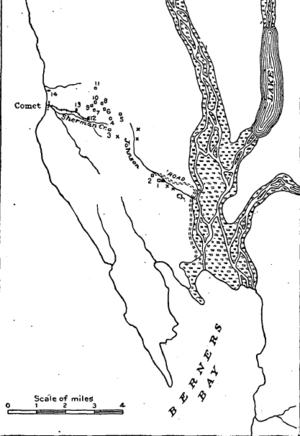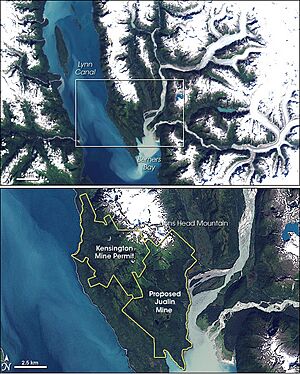Jualin Mine facts for kids

The Jualin Mine was once a busy gold mine in Alaska. It is located near Juneau, Alaska, about 44 miles (71 km) northwest of the city center. A "defunct" mine means it is no longer operating.
Discovery and Early Days
The Jualin gold deposit was found by a prospector named Frank Cook in 1895. Soon after, the Jualin Mining Company started digging for gold. They set up a special machine called a stamping mill. This mill could crush about 30 tons of rock every day to get the gold out.
The mine operated off and on from 1896 to 1901. It opened again from 1905 to 1908. However, it had to close because too much water was getting into the mine. There were also problems with not having enough electricity to run the equipment. At that time, the mine was about 210 feet (64 meters) deep.
Deepening the Mine
In 1912, a group from Belgium bought the Jualin Mine. They wanted to make it better and dig deeper. By 1914, the main shaft, which is like a deep elevator shaft, was dug down to 325 feet (99 meters). Miners were working at the 310-foot (94-meter) level.
The company also planned to build a long tunnel. This tunnel would help drain water and make it easier to move rock out of the mine. It was supposed to be about 7,800 feet (2,377 meters) long. But then World War I started, and the work stopped. The tunnel was only about 5,000 feet (1,524 meters) long when the war began.
Later Years and Modern Use
After World War I ended, a new company, Southeastern Alaska Mining Corporation, tried to restart the mine. But their efforts didn't work out, and the mine stayed closed for many years.
Later, in the late 1900s, a company called Coeur Alaska bought the mining rights. Coeur Alaska is part of a bigger company called Coeur Mining. They also bought rights to the nearby Kensington mine. Today, Coeur Alaska rents the Jualin property from Hyak Mining Company, which owns the land.
The Jualin site is now used for offices and support buildings for the Kensington Mine. However, Coeur Alaska is still looking into the Jualin site. They want to see if there's more gold that can be mined there in the future.
Gold Production
From 1896 to 1919, the Jualin Mine produced a lot of gold. About 36,000 ounces (1,021 kg) of gold were taken out of the mine. This made it the fourth most productive mine in the Juneau Mining District during that time. Other big mines in the area included Alaska-Juneau (AJ), Perseverance, and Treadwell.
 | Bayard Rustin |
 | Jeannette Carter |
 | Jeremiah A. Brown |


